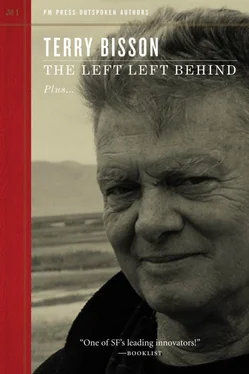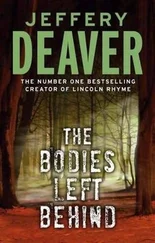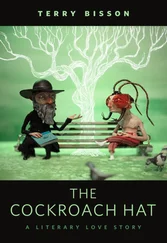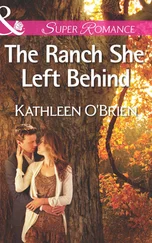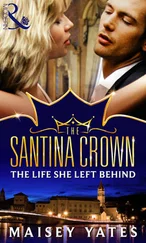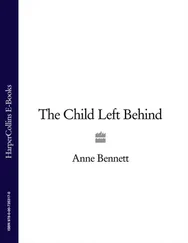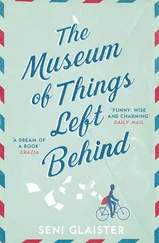All political books?
Mostly. Though Charles Mingus’s Beneath the Underdog was a big seller. Assata’s bio was big. Our bestseller was Settlers: The Myth of the White Proletariat . Every student of labor history should find and read that classic.
Have you ever been a union member?
I tried the National Writers Union (NWU) once. But alas, free-lance scribblers are independent contractors, including myself.
Do you miss your time as an activist and organizer?
Not so much. I was never good at mass work. I finally had to face the fact that I am, in fact, a petit bourgeois intellectual and make the most of it.
Have you written any traditional SF? You know, with a rocket ship on the cover?
Absolutely. Time travel, first contact, little shop stories, space travel. Even a robot or two. My latest novel, Planet of Mystery is about the first landing on Venus. I believe in knowing and respecting the conventions and traditions of your field, whatever it is. I think every rock band should be required to work up a version of “Johnny B. Good.”
As a matter of fact, my next book after Fire on the Mountain had a BIG rocket on the cover. Voyage to the Red Planet is pretty standard space travel stuff with some elements of political satire, I suppose. In it, the first trip to Mars is financed by Hollywood.
Do you work on a regular schedule?
I try to; mornings. My novels have never made enough so I have always had to do pickup writing and editing on the side. What I call afternoon work. I wrote a bunch of novelizations (making a film script into a book, which is sort of a backward project) and packaged a goofy series called The No-Frills Books . I did a car book with Click and Clack the Tappet Brothers (NPR). Working with them was fun. They hired me because I had mechanic experience and because I had once played in a bluegrass band, the Allen County Jumper Cables. I also wrote a biography of Nat Turner for “young adults” whatever that means. I’m still fond of that book, which is found in most libraries.
And you wrote a biography of Mumia Abu Jamal.
Ona Move . Mumia’s title. That was a labor of love, though it paid well too. I was lucky enough to meet Mumia back in the 80s, through a friend who was in prison with him. I visited, and we became friends. I helped him get his first book, Live from Death Row published. We still are friends, though I have seen him only once since I moved to California. He wrote the introduction to the new edition of Fire on the Mountain which PM is bringing out. He has been in solitary confinement for over twenty years.
And yet he continues, though his radio work and his writing, to be the “voice of the voiceless.”
And he is innocent.
And they know it. That’s the most shameful part.
Perhaps your most widely-read story is “They’re Made out of Meat.” It’s often found on the internet.
That’s cool. I like writing all-dialogue stories. I have done several. They tend to be short, although one of them, “macs,” was longer. There is something about stories in which everything is revealed in dialogue that appeals to me.
Like a radio play?
Exactly. I have done several radio plays, and even got one produced at Radio City. But it’s way too hard to get anything produced on the radio. It’s a perfect venue for SF, but it seems all anyone wants to do is jokey retro stuff like Garrison Keilor’s “noir” detective. It’s a drag.
You worked as a mechanic. Was that a stretch for a literary guy?
Not at all. I have always loved cars, even big evil American cars, and I got back into working on them when I lived in the communes. There are always plenty of cars to fix. When my wife and I left the Southwest and moved back to Kentucky (she’s from Tennessee) I found myself working as a tractor mechanic, and then as a transmission man. I still do it but not enough. I miss the problem solving involved. It’s more intellectual than writing, which is a lot of guess-work.
Did your parents read to you?
Never. They were middle class but not bookish. There were no books around our house. I read to myself from an early age. I was lucky. I was taught to read before I went to school by a “colored” babysitter, Lily Mae, who helped me work out the words in Captain Marvel. Shazam — it made sense immediately. I went straight from comics into the Oz books, all thirty-some- odd of them, then on to science fiction, which was easy to find on the drugstore racks. I remember getting a chill reading “Surface Tension” by Blish, probably my first genuine literary experience.
I still think On the Road is a great novel. Other early influences were James Ramsey Ullman and his biography of Rimbaud. A teacher gave me Walden and another turned me on to Beckett. All this was like honey to a sixteen-year-old in Kentucky.
Do you still regard yourself as a Southern writer?
Not really. Some of my early work was set in the South, particularly Talking Man which is about a hillbilly wizard, and “Bears Discover Fire,” a sweet little tale set in Bowling Green that won me my only Hugo. I still love and identify with the South, particularly the Upper Redneck Nascar South.
Darrel Waltrip and Jeremy Mayfield are both from my home town. But I can’t stand the “fried green tomatoes” sort of folksy hometown southmouth crap.
Where do your ideas come from?
From my butt. If I sit on it long enough in front of a word processor, I usually come up with something.
Have you ever written for movies?
I’ve done scripts. An independent producer hired me to write a film about Mumia, which is still being shipped around but with no success. The media is afraid of Mumia. I recently scripted a biopic of Paul Robeson, which is still in play but has never been produced. I would love to see that film done. Robeson is the forgotten man of the civil rights movement. He was totally cast aside because of his politics—he was an unapologetic red and a steadfast friend of the Soviet Union at a time when that was verboten. They were careful not to include him in the March on Washington.
Is your interest in Robeson the source of your play Special Relativity ?
No, the play was done long before the screenplay. My agent suggested I write something about Hoover’s long-time harassment and hatred of Einstein. What I came up with was a comedy, sort of. I’m not sure Robeson would approve. I know Hoover wouldn’t.
SF critic Nick Gevers once called you a satirist, and you insisted you are not. Who’s right?
Gevers, probably. The Left Left Behind is certainly satire, and rather broad at that. So is “The Old Rugged Cross,” though less broad; it’s about a guy on death row who gets religion and insists on being crucified. But usually the satirical elements are secondary. I regard myself as a realist, really. Humor and satire are part of reality.
Aren’t they?
Do you have favorite short story writers?
R.A. Lafferty, the late great SF writer, was a huge influence, though as writers we are very different. He’s a singer; I’m a talker. Thom Jones is I think the best short story writer wiring in America today. Molly Gloss runs a close second. Another favorite is David Sedaris who doesn’t call his work short stories, though they are. He is sneaky.
You have hosted several SF reading series. How did that come about?
Luck, mainly. A good friend in NY, Mark Jacobson, a high-powered journalist ( NY mag , Village Voice ) put together a casual “non fiction” reading series for his fellow journalists who, unlike poets and the literati, rarely get to read in public. Mark pulled me in to help and it was fun. We got big names like David Remnick (before he took over the New Yorker ) and Jummy Breslin and Jack Newfield, plus real-life pornsters, rock critics and wild punk gonzos. Mark knew everybody. Even Steve Earle came and read! We had a regular slot at KGB, a downtown literary bar. Alice Turner, my editor at Playboy , and I decided to try to same thing with fiction, and we teamed up SF writers with “straight” writers, and since Alice also knew everybody, we got Joyce Carol Oates reading with Lucius Shepard, Michael Cunningham with Rachel Pollack, Jonathan Lethem with Brett Easton Ellis. When Alice dropped out I teamed with Ellen Datlow, the premier SF editor, and we ran it as straight SF. Once a month, big names and small. When I moved to California in ’02 I teamed up with Adam Cornford, a poet and professor at New College. Then New College folded and now the program, SFinSF, is sponsored by Tachyon Books. I get to be the “host” and that’s fun as ever.
Читать дальше
